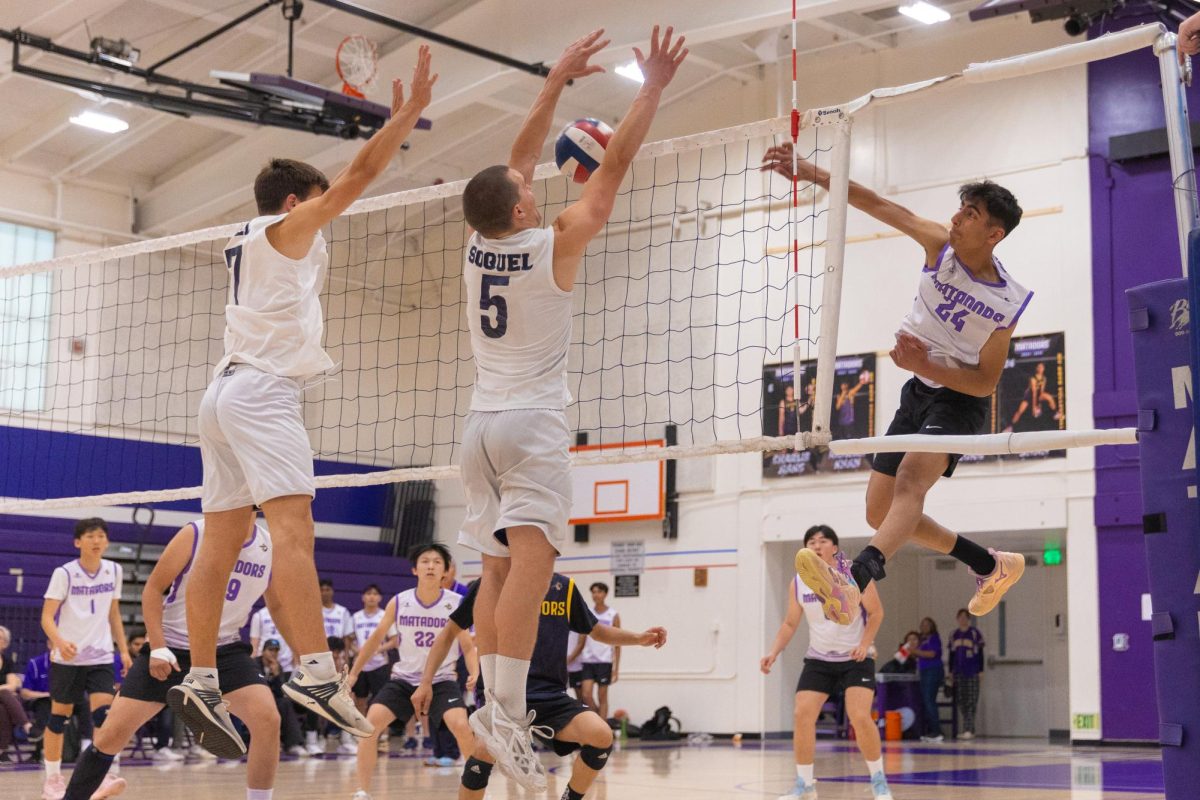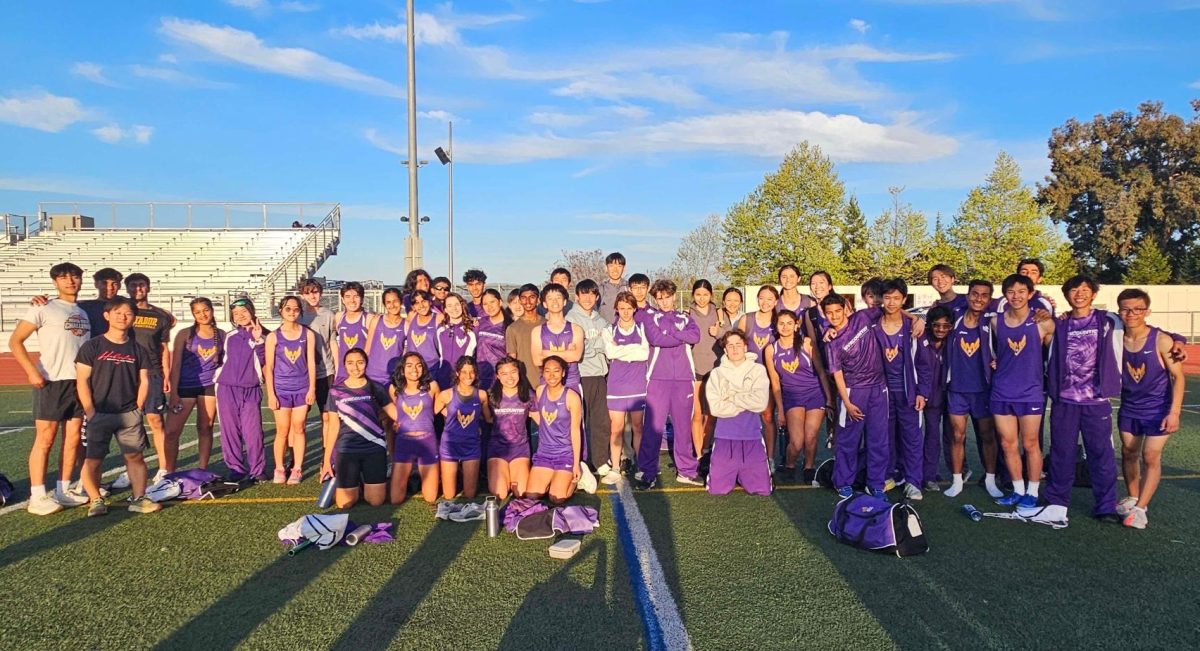BONNIE BELSHE
During the last minute and a half of the Field Hockey game, the score was tied 0 to 0, and the opposing team prepared to make the final shot. However, as the ball sped toward her, she shot out her leg and the ball bounced out. The whistle blew. The game was over. For four years, all she had focused on was to make sure that the opposing team did not score against her own.
This was history teacher Bonnie Belshe’s last Homecoming field hockey game in high school. With six years of experience as goalie, Belshe — then a senior at John Burroughs School — was determined to block anything in her sight. [For years, the sports teams at her high school had played the same rival team for homecoming: Mary Institute Country Day’s High School. And beating them was the ultimate goal. For four years, all she had focused on was to make sure that the opposing team did not score against her own. And she succeeded
Belshe loves teaching history at MVHS, but she has another passion as well: Field Hockey. She played from seventh grade to her senior year in high school and she continues to show her enthusiasm for the sport through coaching the MVHS Junior Varsity team.
“I am a very competitive person, so I certainly fit with sports,” Belshe said. “Particularly from being a goalie, I put a lot of pressure on myself about being that final stop from the other team scoring. I enjoyed that and I liked having those on my shoulders to lead the defense on my team.”
Even though Belshe’s high school required her to take ten periods of classes each day, playing Field Hockey did not distract her from academics. In fact, it allowed her to learn about connection and teamwork. She believes that Field Hockey had a powerful impact on her academic abilities as a young student.
“I was captain by junior year, so I got a lot of leadership training as well,” Belshe said, “You certainly learn that you can’t do everything at once, and you have to prioritize when you’re in season.”
MICHAEL HICKS
Sitting in his sparsely furnished, wood-paneled office, Assistant Principal Michael Hicks grins from across his desk. An assortment of pictures lies behind him — pictures from his wedding, pictures of his children, and senior pictures of Monta Vista alumni. But one picture stands out — a framed picture of Hicks sliding to home plate.
Although Hicks traded the baseball diamond for the Monta Vista office years ago, he still treasures his minor league baseball experience. Hicks started his baseball career by playing with his brothers and dad in the backyard during summers and after school in his adolescence. As he grew older, Hicks realized that he was better than most of his friends and pursued it more seriously. Eventually, he was playing on a club team year-round.
“I think it was a combination, the way a lot of people stumble into something,” Hicks said. “You’re good at it, so you have some experience and success through it, and you enjoy doing it, and when you couple those things, it really becomes an interest and focus of your life.”
Hicks continued to play baseball through college, starting out at Sacramento City College, which is known for its successful baseball program, and then transferring to Centenary College in Louisiana where he played Division I baseball on a scholarship. After Centenary, he discovered tryouts for an independent minor league baseball team, Louisiana’s Shreveport-Bossier Captains team, and went to the tryouts.
“You know there is always a series of luck in baseball. It’s not just about the skills that you can bring or offer but also timing,” Hicks said. “I had a really good tryout, and at that time, they were looking for a right-handed in-fielder, which I was, so they had a spot on the team.”
Hicks eventually played for the Shreveport-Bossier Captains for three seasons. Because his team played in the Central League, Hicks faced teams not only from Louisiana but also teams from Missouri, Mississippi, and Texas. Although he did not receive a high salary and taught during the school year, Hicks still managed to play 96 games during the summer each year.
Eventually, after two and a half seasons, Hicks’ team let him go. Although he never made it to the major leagues. Hicks believes that he is fortunate to even get the chance to play minor league baseball. More importantly, he has never truly left the field; he still plays baseball through the San Jose Men’s Baseball League and coaches as well.
“Even though I only played for two and a half seasons, I look back at it with fondness,” Hicks said. “[Baseball] was something that was very important to me.”
DEBORAH FRAZIER
AP Biology and JAVA teacher Deborah Frazier started rock climbing when she started dating her now-husband and they often rock climbed together in Portland. Frazier credits their shared rock climbing experiences for strengthening her marriage.
In one memorable and terrifying incident with her husband, she fell from Lover’s Leap, a steep cliff near Lake Tahoe. Even though Frazier had climbed many cliffs before, Lover’s Leap was different. Climbers had to use granite dikes, which resemble chin up bars, to propel themselves up, making the climb exceptionally challenging. However, as she was climbing the third pitch — the third steep part of the climb — Frazier fell fifteen or sixteen feet.
“I remember closing my eyes and when I opened them up again, I was upside down again and I was really confused,” Frazier said.
The adrenaline pumping through her system and low blood sugar from a poor lunch added to Frazier’s confusion. However, she did not let her confusion hinder her, and scrambled up to the ledge that she had fallen off of. After she reached the ledge and reassured her worried husband, she insisted that she could still climb and led her husband for the rest of the hike.
Because Frazier and her husband not only followed old routes but also led their own climbing routes, Frazier and her husband developed trust for each other. In fact, Frazier remembers that at her wedding, the best man said that if they can climb together and trust each other so much while climbing, then they make a good couple.







